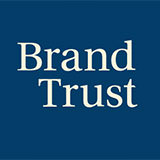
Trust in a brand makes the consumer’s buying decision easier.
How to generate brand trust? Or: When customers stop thinking (1/2)
Article
27. März 2012 ▪ Reading time: approx. 1:30 min.
The purpose of brands is to gain trust. This is how they develop their greatest benefit: They simplify the buying decision and give the customer the needed security to make that decision without much thought. Because people only trust when they stop thinking – and that in turn lowers the transaction costs for the brand owner.
Prof. Dr. Jürgen Häusler, Chairman of Interbrand Central and Eastern Europe, describes the significance of brand trust in an interesting article entitled "Liebe oder Vertrauen?" (Love or trust?) on marketing-site.de. In it, he demystifies the "Love Brands": "The profound feeling many of these brands evoke in us is not love. It is trust. Trust in supposedly "only" functional benefit dimensions," says Häusler
What happens when people trust a brand?
The US study "Brand Trust: The six drivers of trust" supplied some interesting figures:
-
78% of those surveyed perceive the brands they trust more intensely. So trust increases marketing efficiency dramatically.
-
82% repeatedly buy products and services from brands they trust, so they become regular customers. This reduces the customer migration rate, lowers retention costs, and therefore increases profitability, as with long-term customers the acquisition costs are long paid for.
-
78% like to try out new products and services from brands they trust. This makes it easier to launch innovations and lower the associated risk.
-
50% of respondents said they are willing to pay more for the products and services of these brands. For good reason, because trust lowers the typical customer risks like mis-purchases dramatically and relieves the customer from the necessity to critically compare prices and qualities. Mistrust is exhausting, but trust relieves – and customers are willing to pay for that, as has been proven.
-
By far the most important benefit is the customers' willingness to recommend the brands they trust. 83% are willing to do this – without monetary benefits or other incentives.
Recommendation is not only the most efficient way of acquiring new customers, but also by far the cheapest. The recommendation rate is the key indicator that tells you whether a brand is effective or not.
When people trust a brand, they buy more, pay more, try more, and talk more.
All this leads to profitable growth and at the same time lower risk for the owner of the brand, so it has a direct impact on the core aims of any company. This makes it clear: Brands are always a means to an end – and that end is the healthy and profitable growth of the company.
In the second part of the article, I will analyze the five types of trust that are essential for » brand management.














